|
Africana
Author: Michael Schacht
Publisher: AbacusSpiele
Year: 2012
review by

| x |
|
|
|
|
|
|
|
|
|
|
|
|
|
|
|
|
|
|
|
|
|
|
|
|
|
|
|
|
|
|
|
|
|
|
|
|
|
|
|
|
|
|
|
|
|
|
|
|
|
|
|
|
|
|
|
|
|
|
|
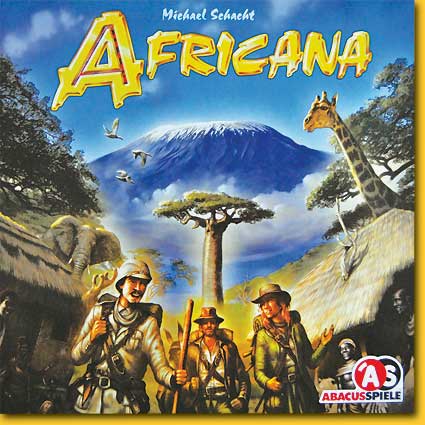 |
|
At the end of the 19th century, the African continent was still partly undiscovered, at least from the prespective of the European nations. Italy, Germany, France and Great Britain all send a team with the continuing mission to explore strange new worlds, to seek out new life and new civilisations, and to boldly fill their pockets with as many treasures as they can get their hands on. Exploitation and robbery, yes perhaps, but we are merely re-enacting the past and therefore not responsible. The richest nation wins the game!
|
|
|
| x |
|
|
|
|
|
|
|
|
|
|
|
|
|
|
|
|
|
|
|
|
|
|
|
|
|
|
|
|
|
|
|
|
|
|
|
|
|
|
|
|
|
|
|
|
|
|
|
|
|
|
|
|
|
|
|
|
|
|
|
|
The game board shows Africa, roughly divided in a brown north- and a white south side, with cities and connecting roads. Each city shows 1 or 2 symbols; to travel to this city from an adjacent city players have to play a card showing either of these symbols. Both halves contain a wooden book, with adventure cards as pages. These cards depict a treasure, plus the city where the treasure can be claimed, and a number of coins and victory points. At the bottom of the board five expedition cards are placed, each depicting two cities. The first player that travels the route between these two cities is awarded with the number of coins and victory points depicted on the card.
|
|
|
| x |
|
|
|
|
|
|
|
|
|
|
|
|
|
|
|
|
|
|
|
|
|
|
|
|
|
|
|
|
|
|
|
|
|
|
|
|
|
|
|
|
|
|
|
|
|
|
|
|
|
|
|
|
|
|
|
|
|
|
|
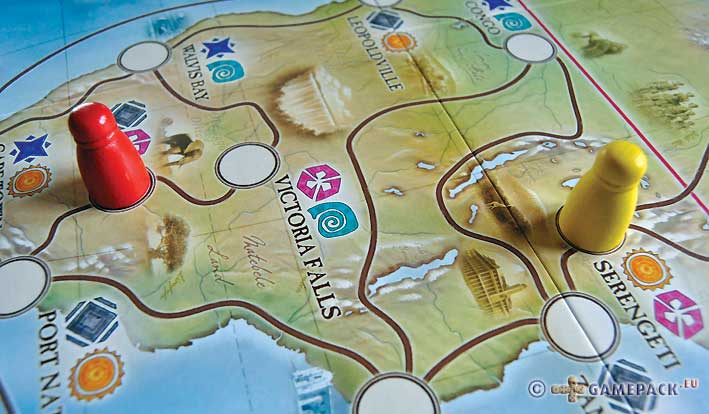 |
| x |
|
|
|
|
|
|
|
|
|
|
|
|
|
|
|
|
|
|
|
|
|
|
|
|
|
|
|
|
|
|
|
|
|
|
|
|
|
|
|
|
|
|
|
|
|
|
|
|
|
|
|
|
|
|
|
|
|
|
|
|
The four nations take their starting positions in the four corners of the continent. In his turn, a player chooses between drawing two travel cards, buying adventure cards from the book, or travelling. Adventure cards cost five coins. A player may turn one page for free, and subsequently as many as he wants for 1 gold per page. A player is allowed to buy and turn as many cards as he can afford. After purchase, the adventure cards are placed face-up in front of him. Players residing on the north side of the board are only allowed to buy from the north side book and vice versa; of course, the north side book contains adventure cards featuring cities on the south side of the board: you always have to travel some distance to be able to claim the treasure! Travelling is the main action of the game.
|
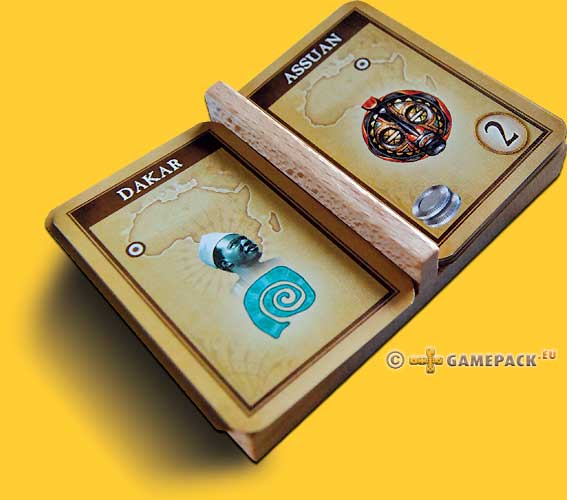 |
|
|
| x |
|
|
|
|
|
|
|
|
|
|
|
|
|
|
|
|
|
|
|
|
|
|
|
|
|
|
|
|
|
|
|
|
|
|
|
|
|
|
|
|
|
|
|
|
|
|
|
|
|
|
|
|
|
|
|
|
|
|
|
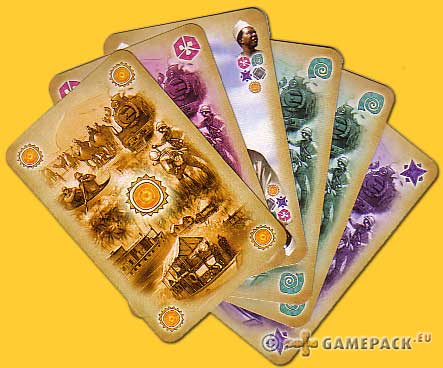 |
|
By playing travel cards with the right symbol, the player's pawn can be moved from city to city. There is a hand limit of five cards, so the number of steps a player can take is also limited. If a player enters a city and he has an adventure card of this city in front of him, he may claim the indicated reward in coins, and he places the card below his nation card for the scoring phase at the end of the game. If he enters the starting-city of one of the five expedition cards at the bottom of the board, he can enter the expedition. He places one of his discs on the expedition card, and takes the bonus (1 card, or 1 or 2 coins). One expedition card can contain the discs of more than one player. As soon as one of the participating players reaches the destination city of the expedition, he receives the money, and the card for scoring at the end of the game. All the other participants merely get their discs back, and nothing else.
|
|
|
| x |
|
|
|
|
|
|
|
|
|
|
|
|
|
|
|
|
|
|
|
|
|
|
|
|
|
|
|
|
|
|
|
|
|
|
|
|
|
|
|
|
|
|
|
|
|
|
|
|
|
|
|
|
|
|
|
|
|
|
|
|
Then, a new expedition card is drawn. It is allowed to cover the entire route in one single turn, and in his turn a player can join as many expeditions as he wants. It is also possible to do more than one of these things in a single city: starting or ending one or more expeditions, and claiming one or multiple adventure cards. After his turn, the travel cards end up on the discard pile, except for the wild card that all players have received at the start of the game: he returns this card to his hand.
|
|
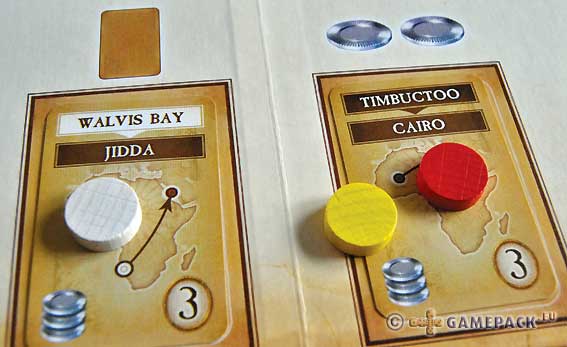 |
|
|
| x |
|
|
|
|
|
|
|
|
|
|
|
|
|
|
|
|
|
|
|
|
|
|
|
|
|
|
|
|
|
|
|
|
|
|
|
|
|
|
|
|
|
|
|
|
|
|
|
|
|
|
|
|
|
|
|
|
|
|
|
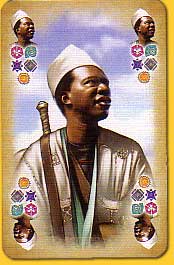 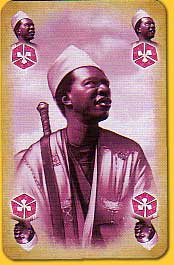 |
|
Since this wild card can be used for any symbol, players are always able to move at least one step to any adjacent city. There are also helper cards, in each of the five different colours (symbols), which can be earned with some of the adventure cards. Helpers are also returned to the hand and never discarded.
|
|
|
| x |
|
|
|
|
|
|
|
|
|
|
|
|
|
|
|
|
|
|
|
|
|
|
|
|
|
|
|
|
|
|
|
|
|
|
|
|
|
|
|
|
|
|
|
|
|
|
|
|
|
|
|
|
|
|
|
|
|
|
|
|
The game is over when the expedition cards run out. The players then receive points for all their expedition- and adventure cards, penalty points for helper cards, and bonus points for combinations of identical or different treasures.
|
|
|
| x |
|
|
|
|
|
|
|
|
|
|
|
|
|
|
|
|
|
|
|
|
|
|
|
|
|
|
|
|
|
|
|
|
|
|
|
|
|
|
|
|
|
|
|
|
|
|
|
|
|
|
|
|
|
|
|
|
|
|
|
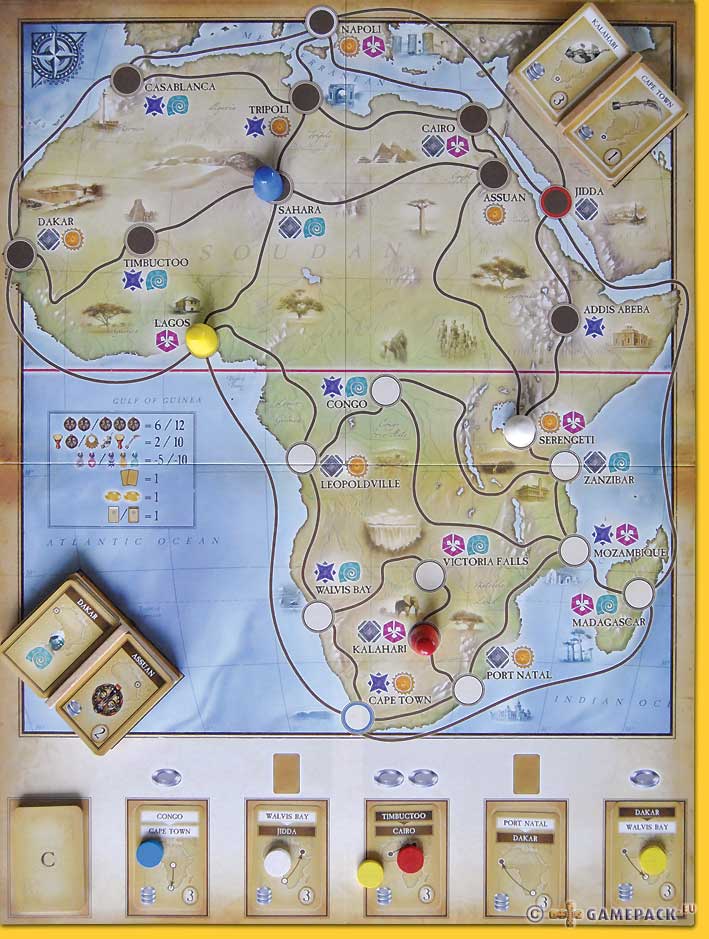 |
|
| x |
| x |
 |
|
|
|
|
|
|
|
|
|
|
|
|
|
|
|
|
|
|
|
|
|
|
|
|
|
|
|
|
|
|
|
|
|
|
|
|
|
|
|
|
|
|
|
|
|
|
|
|
|
|
|
'Africana' is very reminiscent of Valdora, it's actually a simplified version. The expedition cards are a nice element, it is free to join in, and you always receive the participation bonus. If you can't manage to complete the expeditions you loose nothing, and you already gained something upon joining! This means that it is very advantageous to join all possible expeditions, even if you have no intention of ever completing them. Another player probably will! The expeditions are a perfect means to generate some money at the beginning of the game, since the adventure cards are rather expensive. Later in the game, the adventure cards can also be used to generate cash.
|
|
|
| x |
|
|
|
|
|
|
|
|
|
|
|
|
|
|
|
|
|
|
|
|
|
|
|
|
|
|
|
|
|
|
|
|
|
|
|
|
|
|
|
|
|
|
|
|
|
|
|
|
|
|
|
|
|
|
|
|
|
|
|
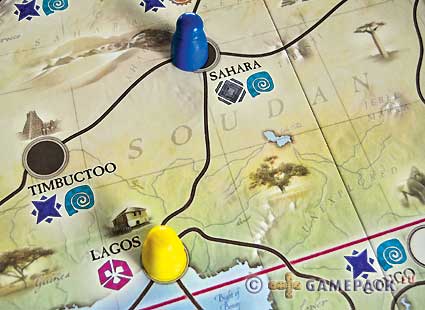 |
|
'Africana' is a rather friendly game; the wild card and the helpers compensate for an 'unlucky draw' at the travel card pile. Of course the element of luck is still clearly present: there will always be players that happen to be in the starting city of every new expedition card that is drawn, or that happen to unveil three favourably situated adventure cards in a row, while other players always have to cross the entire continent. Africana is therefore not an extremely strategic game.
|
|
|
| x |
|
|
|
|
|
|
|
|
|
|
|
|
|
|
|
|
|
|
|
|
|
|
|
|
|
|
|
|
|
|
|
|
|
|
|
|
|
|
|
|
|
|
|
|
|
|
|
|
|
|
|
|
|
|
|
|
|
|
|
|
Player interaction is limited to the competition for the expedition cards, everybody is largely minding their own business with every now and then a quick dash to complete an expedition before somebody else does. Theoretically, you could buy adventure cards with a specific treasure if you notice that an opponent already has some cards with this treasure, since combinations of identical treasures score many points at the end of the game. In practice this hardly ever happens, because first of all you probably don't remember which player has collected which treasures, and secondly the adventure cards are rather expensive, and thirdly you have no idea what wonderful adventure card is revealed when you buy the card on top of it.
|
|
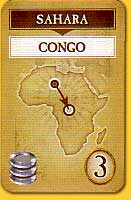 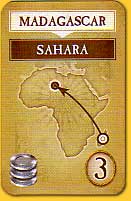 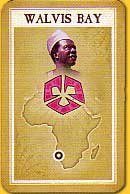  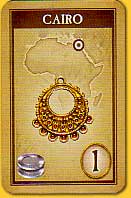 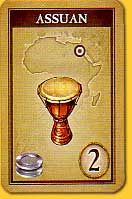 |
|
|
| x |
|
|
|
|
|
|
|
|
|
|
|
|
|
|
|
|
|
|
|
|
|
|
|
|
|
|
|
|
|
|
|
|
|
|
|
|
|
|
|
|
|
|
|
|
|
|
|
|
|
|
|
|
|
|
|
|
|
|
|
|
'Africana' is a nice game with a low threshold, and is therefore ideally suited for less experienced players. The element of luck in no less than three different stacks of cards makes it a game of chance, but the decisions that you are able to make within these limits are interesting enough to make this game worthwhile for the more experienced player.
© 2012 Barbara van Vugt
Africana, Michael Schacht, AbacusSpiele, 2012 - 2 to 4 players, 8 years and up, 60-90 minutes
|
|
|
  |
|
|
|
|
|
|
|
|
|
|
|
|
|
|
|
|
|
|
|
|
|
|
|
|
|
|
|
|
|
|
|
|
|
|
|
|
|
|
|
|
|
|
|
|
|
|
|
|
|
|
  |
|
|
|
|
|
|
|
|
|
|
|
|
|
|
|
|
|
|
|
|
|
|
|
|
|
|
|
|
|
|
|
|
|
|
|
|
|
|
|
|
|
|
|
|
|
|
|
|
|
|
  |
|
|
|
|
|
|
|
|
|
|
|
|
|
|
|
|
|
|
|
|
|
|
|
|
|
|
|
|
|
|
|
|
|
|
|
|
|
|
|
|
|
|
|
|
|
|
|
|
|
|
  |
|
|
|
|
|
|
|
|
|
|
|
|
|
|
|
|
|
|
|
|
|
|
|
|
|
|
|
|
|
|
|
|
|
|
|
|
|
|
|
|
|
|
|
|
|
|
|
|
|
|
| x |
|
|
|
|
|
|
|
|
|
|
|
|
|
|
|
|
|
|
|
|
|
|
|
|
|
|
|
|
|
|
|
|
|
|
|
|
|
|
|
|
|
|
|
|
|
|
|
|
|
|
|
|
|
|
|
|
|
|
|
| x |
|
|
|
|
|
|
|
|
|
|
|
|
|
|
|
|
|
|
|
|
|
|
|
|
|
|
|
|
|
|
|
|
|
|
|
|
|
|
|
|
|
|
|
|
|
|
|
|
|
|
|
|
|
|
|
|
|
|
|
 |
|
|
|
|
|
|
|
|
|
|
|
|
|
|
|
|
|
|
|
|
|
|
|
|
|
|
|
|
|
|
|
|
|
|
|
|
|
|
|
|
|
|
|
|
|
|
|
|
|
|
 |
|
|
|
|
|
|
|
|
|
|
|
|
|
|
|
|
|
|
|
|
|
|
|
|
|
|
|
|
|
|
|
|
|
|
|
|
|
|
|
|
|
|
|
|
|
|
|
|
|
|
| x |
|
|
|
|
|
|
|
|
|
|
|
|
|
|
|
|
|
|
|
|
|
|
|
|
|
|
|
|
|
|
|
|
|
|
|
|
|
|
|
|
|
|
|
|
|
|
|
|
|
|
|
|
|
|
|
|
|
|
|
 |
|
|
|
|
|
|
|
|
|
|
|
|
|
|
|
|
|
|
|
|
|
|
|
|
|
|
|
|
|
|
|
|
|
|
|
|
|
|
|
|
 |
|
|
|
|
|
|
|
|
|
|
|
|
|
|
|
|
|
|
|
|
|
|
|
|
|
|
|
|
|
|
|
|
|
|
|
|
|
|
|
|
|
|